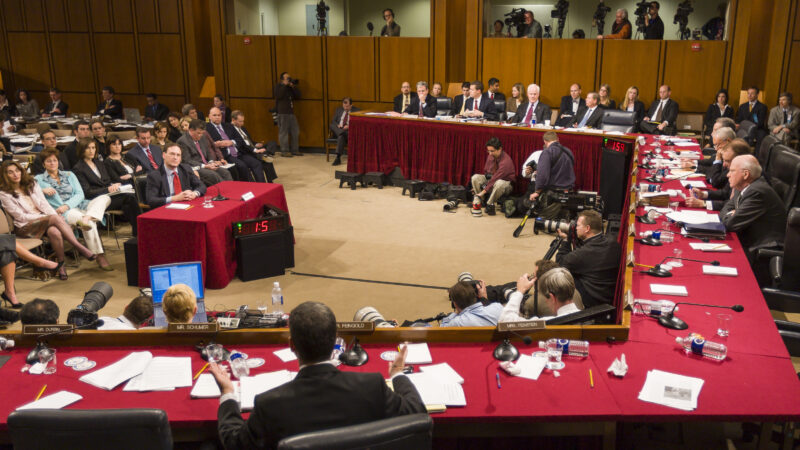Federal Appeals Court Rules for Free Speech & Free Enterprise, Rejecting Florida Law Censoring Private Companies’ Speech on Race and Gender
- March 4, 2024
Tallahassee, FL — On March 4, 2024, in a major victory for free speech in the workplace, a federal appeals court affirmed the injunction against the employer provisions of HB 7, the so-called Stop WOKE Act, holding that it is unconstitutional and that the businesses represented by Protect Democracy and Ropes & Gray, LLC had their speech rights improperly restricted by Florida officials.
“Speech codes have no place in American society, and elected officials have no business censoring the speech of business owners simply because they don’t agree with what’s being expressed,” said Shalini Goel Agarwal, Protect Democracy counsel. “Barring employers from engaging in speech that powerful politicians don’t like is a move straight out of the authoritarian playbook. Today is a good day for the First Amendment and the ability of American businesses to speak freely.”
HB7 was pitched by state officials as a way to “fight back against woke indoctrination” by, among other things, barring employers from engaging in speech that “advances” certain “concepts” regarding race, sex, or national origin.
“[W]e reject this latest attempt to control speech by recharacterizing it as conduct,” per a unanimous decision from a three-judge panel of the 11th Circuit. “Florida may be exactly right about the nature of the ideas it targets. Or it may not. Either way, the merits of these views will be decided in the clanging marketplace of ideas rather than a codebook or a courtroom.”
A previous federal court ruling described HB7 as a bizarro inversion of traditional free speech values, invoking the Netflix show “Stranger Things” to describe the law as a “First Amendment upside down” that upends the Bill of Rights.
Plaintiffs in the case are Florida honeymoon registry technology company Honeyfund.com and Florida-based Ben & Jerry’s franchisee Primo Tampa, along with workplace diversity consultancy Collective Concepts and its co-founder Chevara Orrin.
“Today’s ruling is a victory for my freedom of speech and that of all other business owners, but it’s also a victory for the free market: businesses remain free to respond to guest and team member needs,” said Antonio McBroom, CEO of Primo Tampa, a Black-owned franchise of Ben & Jerry’s ice cream shops. “The government obviously has no right to patrol my workplace for words that some politicians don’t like. And the government obviously has no right to substitute its preferences for those of any businesses’ guests and team members. ”
“We moved Honeyfund to Florida in 2017 because it was known as a business-friendly state,” said Sara Margulis, CEO of the popular wedding registry, Honeyfund.com. “Passing laws that seek to squash free speech like HB7 is not only a violation of The First Amendment but is also a losing strategy because businesses serve people of all backgrounds, walks of life, and political views. Therefore the law would have effectively hampered the ability of Florida businesses to grow and serve their market. I don’t think that’s what Florida really wants. It’s clearly not in line with American values. I couldn’t be happier that we stood up for free speech and business in the state of Florida.”
“A powerful message was delivered today making clear that those in elected office with the mandate to lead do not have a pass to trample the Constitution in order to target their political opponents, appeal to their base, or for any other reason,” said Chevara Orrin, founder of corporate diversity consultancy Collective Concepts. “Apart from being illegal, it’s increasingly clear that targeting core American rights is not popular with voters either.”
“The First Amendment is the bulwark that protects all our other constitutional rights, including the ability to fight for full equal protection,” said Doug Hallward-Driemeier, who heads Ropes & Gray’s appellate practice. “The panel rightly noted that DEI issues are at the center of many crucial ongoing public discussions. In the aftermath of the murders of George Floyd and others, DEI programs have helped educate many of us about the pervasive structural racism that stands as an obstacle to true equality before the law. This decision allows those critical conversations to continue without government interference.”
In an effort to take a public stand against alleged “corporate wokeness,” Defendant Florida Gov. Ron DeSantis and other state officials used HB7 to prevent employers from requiring their employees to hear speech that promotes any of eight broad concepts related to race, sex, or national origin. The law’s vaguely worded prohibitions covered concepts central to mainstream diversity, equity and inclusion (DEI) instruction—concepts like implicit bias and male privilege—conducted by many Fortune 500 companies.
The Stop WOKE Act is a speech code that takes a page from the authoritarian playbook. It sought to censor ideas that challenge government officials’ preferred narrative, muzzle independent institutions, and direct outrage toward disfavored groups. HB7 was criticized by legal experts across the political spectrum who warned that the law flouted well-established Supreme Court precedent and set a dangerous precedent for further erosion of freedom of speech.
Read the decision Read the decision
More information about our challenges to censorship of speech on race and gender More information about our challenges to censorship of speech on race and gender
Related Content
Join Us.
Building a stronger, more resilient democracy is possible, but we can’t do it alone. Become part of the fight today.
Donate
Sign Up for Updates Sign Up for Updates
Explore Careers Explore Careers
How to Protect Democracy How to Protect Democracy

